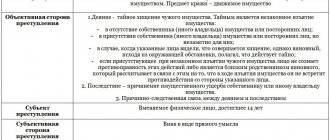1. The body of inquiry, the inquiry officer, the investigator has the right to detain a person on suspicion of committing a crime for which a sentence of imprisonment may be imposed, if one of the following grounds exists: 1) when this person is caught committing a crime or immediately after its commission; 2) when victims or eyewitnesses point to this person as having committed a crime; 3) when obvious traces of a crime are found on this person or his clothing, on him or in his home.
2. If there is other data giving grounds to suspect a person of committing a crime, he may be detained if this person tried to escape, or does not have a permanent place of residence, or his identity has not been established, or if the investigator, with the consent of the head of the investigative body, or the interrogating officer with With the consent of the prosecutor, a petition was sent to the court to select a preventive measure in the form of detention in relation to the specified person.
Legal advice on comments to Art. 91 Code of Criminal Procedure of the Russian Federation
- Leonid Malyarov
how long can they be kept under arrest under 91st to find outQuestion answered over the phone
Detained on suspicion of committing a crime. It was not confirmed, how long do they have the right to detain me?
- Question answered over the phone
about the cops. I was called to testify, and I, as a victim, did not believe in my testimony; they kept me in the department, trying to force me to remember the details of the event, for how long they can keep me in the department, if at all they have the right, and what can be presented to them in such situations
- Lawyer's answer:
1. Procedural detention in accordance with Art. 91 of the Code of Criminal Procedure of the Russian Federation is not applicable here, since only a person suspected of committing a crime can be detained. I am correcting the previous ones - the period of procedural detention is 48 hours or 2 days (well, not three). 2. The period of administrative detention is up to 3 hours. In accordance with Art. 189 of the Code of Criminal Procedure of the Russian Federation - if the interrogated person came with a lawyer to provide legal assistance, then he is present during the interrogation. If there are fears of illegal detention or pressure, it’s easy to play it safe. 3. They have no right to detain you. In this case, record the time of arrival and departure to the department (photo, telephone, witnesses) and complain to the prosecutor. You can have the telephone number of the supervising prosecutor and if you are slightly detained, the prosecutor’s phone number will be immediately filled with information, with the requirement to immediately sort it out. They will let you go.
A friend of mine was detained at 11. She visited three police stations and was only assigned to a temporary detention center at 3 am. Is this legal?
- Lawyer's answer:
Detention in a criminal case is regulated by Art. Art. 91, 92 of the Code of Criminal Procedure of the Russian Federation. According to Part 1 of Art. 92 of the Code of Criminal Procedure of the Russian Federation After the suspect is delivered to the body of inquiry or to the investigator, a detention protocol must be drawn up within no more than 3 hours, in which a note is made that the rights provided for in Article 46 of this Code are explained to the suspect. Therefore, it is necessary to find out when the arrest report was drawn up. in accordance with Art. 91 of the Code of Criminal Procedure of the Russian Federation and if this deadline is not met, file a complaint with the prosecutor’s office. If administrative detention, then according to Art. 27.5 of the Code of Administrative Offenses of the Russian Federation, the total period of administrative detention is 3 hours. If your friend is being investigated for an administrative offense that entails administrative arrest as one of the administrative penalties, she may be subject to administrative detention for a period of no more than 48 hours. Also, a period of detention of 48 hours is possible in the case provided for in Art. 27.5 part 2 of the Code of Administrative Offenses of the Russian Federation.
Please tell me for what reason a person can be detained in the police from morning until evening!!!!
- Administrative detention (to establish an identity, for example) cannot exceed 3 hours. Detention on suspicion of committing a crime can last up to 48 hours depending on the grounds. provided for in Art. 91 Code of Criminal Procedure of the Russian Federation
- You can always come up with as many reasons for checking documents as you like (similar to the person indicated in the orientation). As for “detention,” this term has a strictly defined meaning in the law. So, for example, for detention under...
Does detention under Article 91 of the Code of Criminal Procedure of the Russian Federation always end with serving time in a pre-trial detention center before trial?
- The decision is made by the investigator if he has reason to believe that the suspect will escape. If, for example, he is a citizen of another state, almost 100% Detained in accordance with Art. 91 of the Code of Criminal Procedure of the Russian Federation, are kept in a temporary detention facility, but not in a pre-trial detention center, but in...
Taking action against the accused
The detention of this person is carried out for short-term placement in custody for the purpose of immediately bringing the subject to court. The authority is considering a petition to implement a preventive measure against a citizen. The detention of the accused is aimed at preventing the subject from being detained in absentia. In this case, the procedural action has specific goals, grounds, conditions and motive. The latter is the fear that a citizen may avoid appearing at the meeting. The condition is the issuance of a reasoned decision to charge a person with the status of an accused. In exceptional cases, an act is drawn up, since during an inquiry, in accordance with the general rules, detention cannot be used. The goal is to immediately bring the citizen to court. The basis for the detention of the accused is the need to consider the petition.
Another commentary on Article 92 of the Criminal Code of the Russian Federation
1. In fact, this norm deals with the grounds and conditions for the release of minors from punishment, including their placement in a special closed educational institution of the educational authority.
2. It follows from the law that: firstly, the court can release a minor convicted of a crime of minor or moderate gravity from punishment using general compulsory measures of educational influence (Part 2 of Article 90 of the Criminal Code); secondly, release from punishment is possible with placement in a special closed-type educational institution of an educational management body, but this measure is considered as a specific type of compulsory educational measures and is applied only by the court in order to replace the punishment of a minor when he is convicted of a crime of average gravity, as well as a serious crime; the maximum period of its application does not depend on the maximum punishment provided for by the Criminal Code for a crime committed by a teenager, and is three years; thirdly, the law contains an exhaustive list (Part 5 of Article 92 of the Criminal Code) of crimes for the commission of which this type of exemption from punishment is not applied. We believe that such a decision is completely justified and will allow us to distinguish between minors who have committed very dangerous crimes.
3. The court is given the right to shorten the period of stay of a minor in these institutions or extend it if it is necessary for the teenager to complete general educational or professional training. The analyzed article of the Criminal Code clearly outlines the grounds on which the period of stay of a minor in a special educational (closed type) or medical educational institution can be prematurely terminated and extended.
Obligation to make amends for harm caused
Imposing the obligation to make amends for the harm caused means compensation for the damage caused by the crime with one’s own means or one’s own labor. The law does not prohibit making amends for any harm caused through monetary compensation, especially with the consent of the victim. The type of harm that a minor must compensate is not defined by law. Accordingly, the court may impose on the minor the obligation to compensate for both material and moral damage. This measure is prescribed taking into account the property status of the minor and the availability of appropriate labor skills.
Examples of judicial practice
Detaining a suspect is one of the most common procedural coercive measures, so there are plenty of examples of this.
These include:
- In one of the restaurants in the city of N., waiter I was killed with a pistol. The police who arrived at the scene detained citizen A. The basis for this was a quarrel between the suspect and the waiter and the blood of the murdered person on the clothes of citizen A. The suspect denied his guilt and gave arguments in favor of that the killer is a completely different person. The Investigative Committee investigator sent a petition to the court to extend the period of detention. The court rejected the investigator’s request due to the fact that he did not fulfill his duties in good faith: he did not request recordings from CCTV cameras that were available in the restaurant, did not interview witnesses, etc., but chose the first person suitable for arrest, considering that there would be a coincidence cannot, and that there is blood on the clothes and a quarrel - this is strong evidence.
- During a personal search of citizen N., suspected of theft, police officers were unable to find any stolen items on him. Instead, a gas pistol was found, converted to fire live ammunition. As it turned out, citizen N. tried to escape after committing a more serious crime. He was detained for 48 hours. During this time, a ballistic examination was carried out and it was established that it was from the discovered pistol that Citizen I was killed. Citizen N. was placed in a pre-trial detention center pending trial.
- A criminal case was initiated against citizen M. under Article 159, Part 3 of the Criminal Code of the Russian Federation. The maximum possible punishment for this offense is 6 years, so the investigator had the right to detain him as a suspect. Immediately before the interrogation, citizen M. consulted with a lawyer, who defined his client’s offense as tax evasion without signs of fraud. Citizen M. made an entry about this in the protocol. The investigator could not prove otherwise and was forced to release the suspect. There is no provision for imprisonment for tax crimes, which means that pretrial detention is not possible. It later turned out that suspect M. was telling the truth.
There are thousands of such examples. At the same time, release after 48 hours of detention is not always the result of the suspect’s detention.
Statistics of decision-making under Article 91 of the Code of Criminal Procedure
The Judicial Department of the Supreme Court of the Russian Federation regularly publishes a report on the activities of courts of general jurisdiction. Among other indicators, this report contains information on the practice of court consideration of requests for a preventive measure.
From this document it follows that in 2022 the courts considered more than 126,000 such petitions. The courts satisfied 113,187 of them. The statistics are not significantly different from the 2016 figures. In 2016, the courts considered over 136,000 thousand such petitions and granted 123 thousand of them. In percentage terms, the statistics for these years are not much different: 89.66% in 2017 versus 90.27% in 2016.
What most often influences decision making?
The main influencing factor, according to current legislation, is the presence or absence of grounds for detention.
Also has meaning:
- danger of the suspect to society;
- characteristics of the suspect;
- possibility of relapse;
- the likelihood of evading participation in investigative actions and in court.
In addition to detention, after 48 hours of detention, it is possible to impose other preventive measures in addition to being in a pre-trial detention center, for example, house arrest, recognizance not to leave, or bail.
Transfer to supervision
Supervision of persons who have committed crimes as minors consists of monitoring their behavior and conducting appropriate educational work with them. The law assigns supervision to parents, persons replacing them, as well as specialized government bodies.
Transferring a minor under the supervision of parents or persons replacing them essentially involves drawing the attention of these entities to the need for a more thorough approach to the upbringing of a minor. Paragraph 34 of the Resolution of the Plenum of the Supreme Court of the Russian Federation dated 02/01/2011 N 1 “On the judicial practice of applying legislation regulating the specifics of criminal liability and punishment of minors” contains the following explanations:
“When deciding on the transfer of a minor to the supervision of parents or persons replacing them, the court must make sure that these persons have a positive influence on him, correctly assess what he has done, can ensure his proper behavior and daily control over him. To do this, it is necessary, for example, to request data characterizing the parents or persons replacing them, to check their living conditions and the possibility of providing financial support for the minor. In this case, the consent of the parents or persons replacing them must be obtained to transfer the minor to their supervision.”
Transferring a minor under the supervision of a specialized government agency involves carrying out individual preventive work with the minor for the purpose of his socio-psychological rehabilitation and preventing him from committing new crimes (Article 1 of the Federal Law of June 24, 1999 N 120-FZ). The criminal law does not precisely define the specialized state body under whose supervision a minor may be transferred; such a body may be one of the bodies or institutions of the system for the prevention of neglect and juvenile delinquency (Article 4 of the said Law).
The following commentary to Article 91 of the Code of Criminal Procedure of the Russian Federation
If you have questions regarding Art. 91 of the Code of Criminal Procedure, you can get legal advice.
1. Detention in Russian criminal proceedings is a short-term deprivation of liberty of a person suspected of committing a crime, without first obtaining the sanction of a prosecutor or a court decision. The purpose of detention is to stop criminal activity, prevent the suspect from hiding from the investigation and the court, prevent the suspect from falsifying evidence and other attempts to interfere with the reliable establishment of the circumstances of the criminal case.
2. The maximum period of detention is 48 hours (Part 2 of Article 22 of the Constitution of the Russian Federation), however, it can be extended by the judge at the request of the inquirer, investigator or prosecutor for no more than 72 hours to provide additional evidence of the validity of the detention (Clause 3 of Part. 7 Article 108). The period of detention begins to run from the moment of actual deprivation of liberty (“capture” at the scene of the crime). This period includes the time of administrative detention of the suspect.
3. Detention is possible in two forms: 1) without a resolution from the body of inquiry, the inquiry officer, or the investigator before the initiation of a criminal case; 2) on the basis of a decision of the investigator after the initiation of a criminal case. The first - with the consent of the prosecutor or investigator with the consent of the head of the investigative body - the form of detention (“capture on the spot”) is not regulated by the criminal procedural law - it is provided for by the Charter of the Police Patrol Service.
4. The detention protocol must be approved by the head of the investigative agency.
5. Detention is permitted if a person is suspected of committing a crime punishable not only by imprisonment, but also by arrest, life imprisonment, and also the death penalty (Articles 54, 56, 57, 59 of the Criminal Code).
6. The list of grounds for detention contained in Art. 91 of the Code of Criminal Procedure is exhaustive and is not subject to general interpretation.
7. In clause 1, part 1, art. 91 of the Code of Criminal Procedure also refers to cases when a person is caught preparing for a crime, as well as during an attempt on his life. Detention immediately after the commission of a crime is used when pursuing a suspect “in hot pursuit.”
8. Eyewitnesses can point to the person who committed the crime (clause 2, part 1, article 91 of the Code of Criminal Procedure), both at the place where it was committed and during procedural actions, for example, identification.
9. Clause 3, Part 1, Art. 91 of the Code of Criminal Procedure is applied, as a rule, in cases where, during procedural actions (search, personal search, seizure, etc.), obvious traces of a crime are found on the clothes, body, or home of a person.
10. In part 2 art. 91 of the Code of Criminal Procedure (other grounds for detention) refers to situations where, for example, the victim identified a criminal on the street, a service dog led him to the suspect’s house, suspicion arose in connection with the use of operational intelligence methods, etc.
11. The Code of Criminal Procedure does not mention the detention of suspects by private individuals with their subsequent transfer to government agencies. However, in accordance with Art. 38 of the Criminal Code, such detention is permissible; it is considered as a basis that excludes the criminality of an act in cases where harm is caused to the detainee. Moreover, a detention that does not cause any harm to the suspect, except that he is forcibly deprived of his freedom, is permissible.
12. It is unacceptable to use detention as a means of forcing a suspect to admit guilt (Order of the Prosecutor General of the Russian Federation of February 21, 1995 “On the organization of prosecutorial supervision over the investigation and detection of crimes”).
13. Persons with diplomatic and other immunity are not subject to detention (Articles 3 and 449 of the Code of Criminal Procedure).
Rights of a criminal suspect
Let's look at the suspect's rights in more detail. He has the right:
- Know what he is accused of. He must be given a copy of one of the three documents on the basis of which the arrest is made. This may be a decision to initiate a criminal case, a detention report, or a decision to apply a preventive measure.
- Make one phone call to your loved ones no later than three hours after the arrest.
- To testify or refuse to testify. Before this, the suspect is warned that any testimony can be used against him during the investigation of the criminal case and in court. A foreign citizen has the right to testify in his native language, and an interpreter is provided to him free of charge.
- Request the help of a free (state-provided) lawyer or hire a specialist for money.
- Issue a notarized power of attorney to a person who will represent his interests in business activities and/or perform any actions with property belonging to the citizen (except for that which may be seized in connection with this criminal case).
- Provide any evidence demonstrating his innocence.
- Submit petitions and challenges to investigators, prosecutors and judges.
- Familiarize yourself with the protocols of all investigative activities in a criminal case and indicate your disagreement with the actions of investigators and interrogators in writing.
- With the permission of the investigator, participate in investigative actions carried out at his request.
- File complaints against the actions or inactions of all officials with whom he interacts, as well as those who make decisions in his criminal case.
If you have a lawyer who will come to you upon request, he will explain your rights in even more detail and also prepare the necessary documents. But until then, knowing your rights will give you confidence during questioning and will also help you avoid making mistakes that will complicate the process of establishing your innocence.
What does judicial practice show under this article?
Judicial practice under this article is extensive, since many minors commit crimes. More often these are minor or moderately serious acts that are limited to warning and supervision.
Case studies:
- Citizen E., at the age of 13, and his classmates beat his neighbor for 10 years, after which he ended up in the hospital with a concussion. The actions of the criminals were regarded as of moderate gravity; due to their minor age, they could not be held accountable, so the parents were fined, and the teenagers themselves were limited in their freedom of action; control over supervision was transferred to the parents.
- Citizen M. stole 3 thousand rubles from her friend, pulling her out of her coat pocket. She noticed and accused her of theft, told her parents, and they filed a lawsuit against M. Since she was a minor, the court could not impose an appropriate punishment. M. was given a warning, her crime was assessed as minor. M.'s parents promised the court that they would monitor her.
- Citizen G. repeatedly humiliated his classmate and insulted his human dignity. This was recognized as a reason for his parents to go to court. Since G. was 13 years old, he avoided responsibility, but his parents were told to set restrictions on the boy’s visits to places and establish strict supervision for six months. G. himself was transferred to another school.
What decisions are most often made under Article 91?
More often, decisions under the article include issuing a warning or supervision. Limiting the leisure time of a juvenile offender. The court decides what punishment to choose depending on the severity of the crime committed, the level of consequences and the possible harm caused to the victims. Parents are subject to special control.










